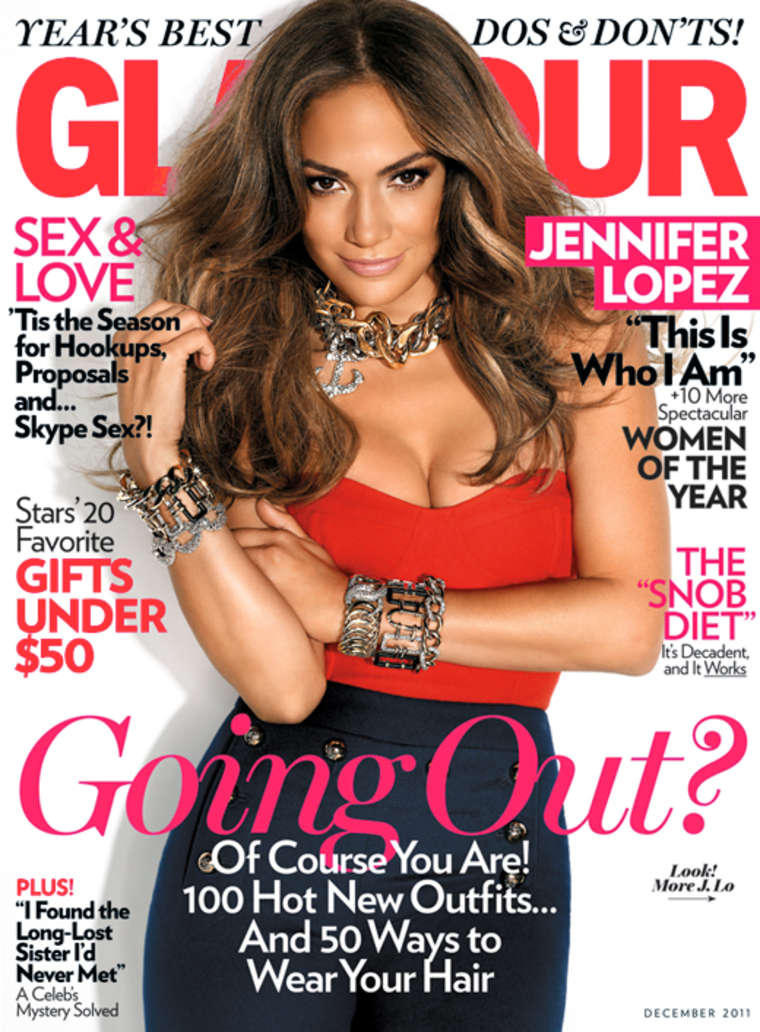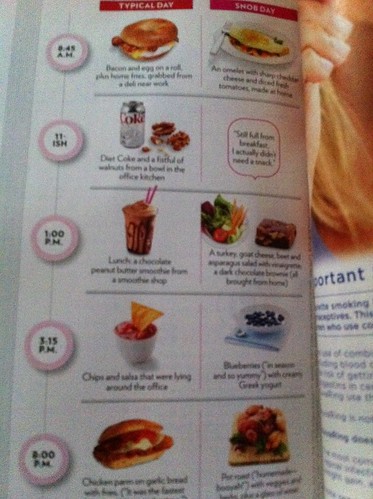Glamour, though, while I used to love it, I've found myself reading the dos and don'ts and ignoring the rest of it. But on this month's cover, there was a teaser that caught my eye: The "Snob Diet." WTF?
 | |
| Jan 2012 Glamour Cover (aka BOOBS) |
 |
| Food snobs wear lavender fur jackets |
Reading the introduction, I was pleasantly surprised. The basic concept is a pretty solid one that most people will be familiar with, especially if you've read any Michael Pollan. Eat real food, eat smaller portions, indulge your cravings. But it did go way over the top with a Gwyneth Paltrow quote: "I'd rather smoke crack than eat cheese from a can." Really Gwyneth? I wonder if she's ever had EZ Cheeze. It has it's place!
This is basically the plan I've been following for the past year plus, and I've lost about 40 lbs. By eating what I want, I find that I eat a lot less. I generally avoid low calorie alternatives, and especially low fat - like sour cream, cream cheese, etc. Seriously, what is the point in low fat ice cream?
There were some really good points in the article along with the basics. It mentioned savoring your food rather than eating quickly, which can lead to eating far less calories. It specifically talks about eating in front of the tv, which is HUGE for me. They also point out that indulging cravings can lead to eating less in total. I've definitely found that to be true, and have learned to just eat what I want in the first place.
 |
| This snob is all like "I can eat chocolates and still look fantastic in my underpants." |
One of the points that they highlight as a positive, though, can be a huge negative for a lot of people. They point out that "Snobs consider what to eat and when," because high quality foods aren't available everywhere. For people who are working, running around, chasing after kids, or traveling a lot, that's not a positive point. That makes this REALLY difficult. Not impossible, but a lot harder than just grabbing a yogurt and running out the door. I think this difficulty is really evident in the "test diet" that they did for a day.
 |
| Why can't a snob eat chips and salsa, dude? |
The real issue is meal prep. On the typical day, the tester grabbed a bagel (and home fries) from a deli, but on the snob day they found time for to make a tomato and cheese omelet. For lunch, a typical day was a stop at a smoothie shop, but the snob day required a lunch brought from home - a salad of turkey, goat cheese, beets, asparagus, and vinaigrette, and a homemade brownie. That's something that could be difficult to find if you were traveling for work (especially for me, since I tend to go to more rural areas where a salad is iceberg lettuce, fried chicken, and ranch dressing.
Dinner was the huge difference in time. On the typical day the tester had a chicken parmesan sandwich with fries. But on the snob day, the had a homemade pot roast with vegetables and herbs. Very few people have time to make a pot roast on a work night. Although, that is something that could be made on the weekend and eaten throughout the week. We do that with soup a lot.
Since the results aren't visible above, the typical day was 2500 calories while the snob day was 2100. That's about a pound a week, but I honestly doubt that this was a typical day for the tester, especially being topped off with a fried sandwich on garlic bread AND fries.
Another thing they don't mention in the article, that could be a big barrier for some people, would be the cost. Obviously for the tester, who ate out for three meals on the typical day, the cost is probably not much more, possibly much less for the snob diet. But for someone going from processed food to the snob foods, it's likely to get a lot more expensive really quickly.
I think it's important to put a premium on the food we eat, and spend as much on the best quality groceries as we can. That's something that Brett and I are trying to remember. But ignoring what can be real issues for tons of women isn't helpful for anyone.
The most insightful thing in the article came at the very end, and just for that, I'm glad I read it. Dietician Ashley Koff is quoted as saying "No one's investing million into making women want cave-aged cheeses and shiitake mushrooms. Instead 10,000 new diet products are marketed heavily each year."
That's something that we can all remember when we're deciding what to have for dinner. And we don't have to be snobs to do it.
